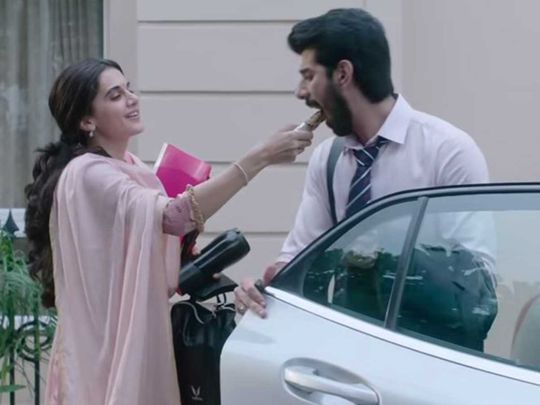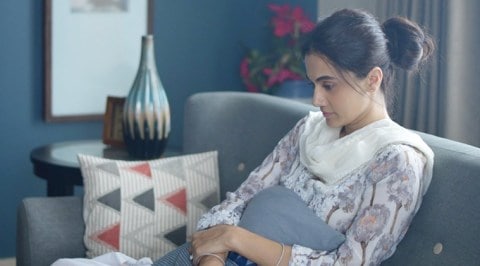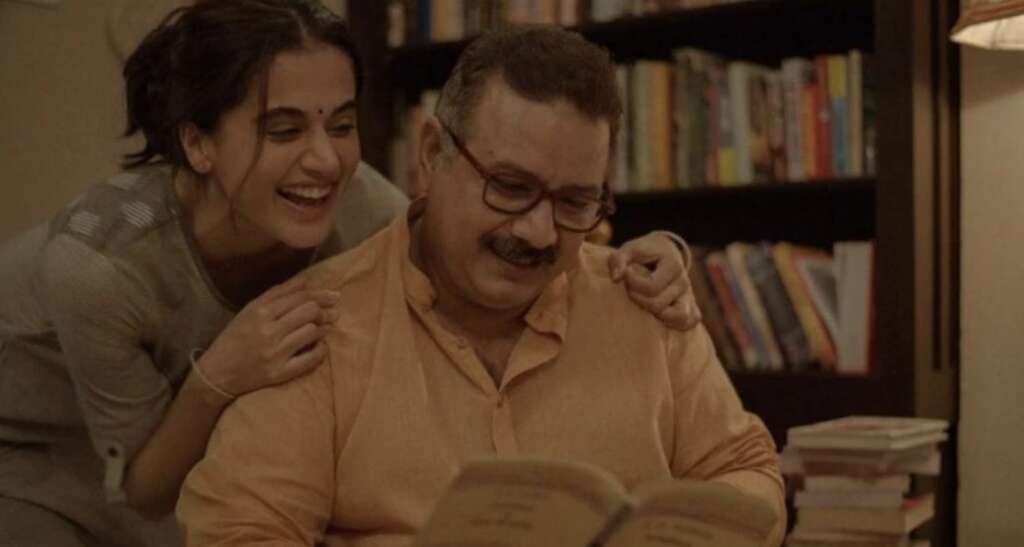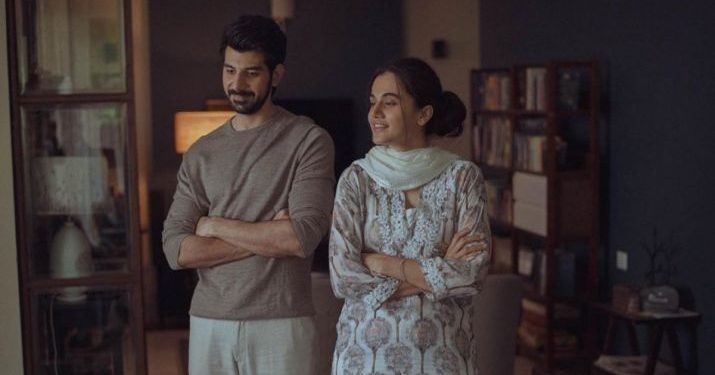‘Thappad se dar nahi lagta sahab, pyaar se lagta hai’. Director Anubhav Sinha’s latest flick has come a long way from normalising physical violence on women to making an ultra sensitive movie on how a wife wants to divorce her man for just one slap. While several bloggers and portals have already given their reviews, Men’s Day Out analyses ‘Thappad’ from a husband’s perspective.
The movie begins on a sweet note of an idyllic couple Amrita and Vikram who are in love and super excited for their move to London. At no point in the film the director portrays the man to be violent, insensitive or someone who can be termed as a bad husband. Unfortunately there comes a moment in the drama, where amidst a heated argument Vikram slaps Amrita in front of several people.
Surely, this is absolutely wrong and no one must support, encourage or forget the same. However, if we are discussing marriage and divorce, the movie must be analysed from both sides of the perspective and cannot be only and only about the woman.

The Husband
Vikram has been shown as a loving and caring man who is ambitious about his career. He also believes in working hard to give a better life to his family….the wife in this case. Regretfully when he learns something unforeseen on his workfront, he happens to raise his hand on Amrita at the spur of a heated moment. Obviously, it becomes an extremely embarrassing and disrespectful incident for the wife, but she chooses not to discuss anything with her husband then.
ALSO READ –
Neha Kakkar’s Ex-Boyfriend | “She Constantly Cried On TV Shows & I Was Cursed On Social Media”
Vikram on the other hand, who is under pressure with regards to his professional life, tries to discuss his mistake with Amrita……however, where he does falter is, he doesn’t say ‘sorry’. Despite the same, throughout the film, Vikram is seen trying to work out things with his wife, persuading her to take it as one off case in aberration and look at brighter things in life. Eventhough there are bitter differences between the couple, the husband reaches out to the woman several times, visits her family and also touches her father’s feet despite the equal pain (on bother personal and work front) that he too is going through. He genuinely wants her to come back and make the marriage work.

The character of this husband is a very real one, where a man could be the best, yet he will end up making mistakes in his life. When the matter reaches divorce, he is also seen getting carried away by his lawyer by signing false petitions, just to ensure his wife returns home.
The last scene is even more touching where Vikram returns to India giving up his most loved London job because he still wants to be with Amrita, yet she does not forgive him and both end up signing a mutual consent divorce. The husband in his concluding statement almost pleads that he will try to win her again someday in this life. This is surely a sign of regretting what he did and doing everything to mend that ‘one’ mistake.
The Wife
The biggest problem with this character is it has no shades of grey at all. At no point in time, the director portrays any wrong side to her and makes us believe how she is perfect and the only victim through the film. Amrita is a housewife, admitted by choice, who had been enjoying her married life with her husband until the ‘slap’ moment. As a woman, such an incident must surely be an eye opener for all, whether one must tolerate the same or take a stand.
But what does taking a stand mean in a marriage? Surely, you cannot make it an ego issue overlooking everything else overnight. Someone who is shown deeply and happily in love with her husband suddenly tells him ‘I don’t love you’. The biggest problem in this issue remains that the wife is not even willing to talk it out with her husband or allow him a second chance to ensure that the mistake does not repeat again.

So, a woman unilaterally decides to leave and end the chapter of marriage shattering several lives in one go.
ALSO READ –
Alaya F On Parents’ Divorce | “They Never Made Me Feel That Something Sad Had Happened”
Amrita is also shown to be extra sweet where she says I don’t want alimony, will have joint custody of the child, keeps meeting with mother-in-law despite ongoing divorce petition and even tries to play a super perfect woman with zero flaws. But sorry Anubhav, this is far from reality and you could have portrayed this character a little more real.
Other Characters
A constant narrative through the movie shows how both mothers were also victims of patriarchy by taking care of their families. Once again, the characters of their husbands too have been shown as genuine and caring, yet somehow the victimisation of women continue. Why does the director never discuss how a man too would have toiled all his life and given up several of his wishes in order to take care of his family equally?
The character of the lady lawyer seemed more practical as she chose to live in her failed marriage purely because of society and the benefits she enjoyed from her family name. This character is also justified of finding ‘happiness and love’ outside a bad marriage. Everyone has a right to be happy, but the reverse would have been termed as a ‘womaniser husband’.

The maid is one genuine victim of patriarchy, who gets beaten up every night, however unfortunately such women never use laws made for their justice.
The ‘Papa Ki Pari’ syndrome is at its peak where Amrita’s father is shown as someone totally supporting his daughter above everything. But when the mother of the husband is genuinely asking her beloved daughter-in-law Amrita to return, she is shown as a villain supporting only her son.

Our Take
- The movie does convey a strong message how women should not take any form of violence within a marriage
- It is also true that a woman can choose to walk out of her marriage and our Gender Biased Laws will support her to the best
- The movie also shows the rampant misuse of Section 498A, where the woman’s lawyer uses it as a tool to bring the man to the negotiation table by threatening him with arrest

- Now, give this a thought too
- Doesn’t physical violence happen to men by their wives? But men have absolutely no recourse to get justice in such cases
- Can a husband go to court for divorce just because his wife slapped him?
- Courts do not consider violence on men as real and yet make them the sole providers who cannot abruptly end their abusive marriages
ALSO READ –
Actor Raghubir Yadav’s Wife Demands Rs 10 Crore Alimony For Seven Yrs Marriage & 25 Yrs Separation
- When it comes to respect, Men in bad relationships are not even considered as human
- And let’s not start reasoning the number of cases for each gender, because the fact remains there is no agency or commission that records cases of Domestic Violence against Men in India
- Having said so, the matter here is not about Men Vs Women
- The larger issue with Thappad is whether marriages should be ended at the drop of a hat? If yes, do both genders have equal opportunity if the other made one-time mistake?
- Yes, the husband was definitely at fault, but don’t we all make humanly mistakes that cannot be rewound?
- If we decide to marry as men and women, don’t you think both couples can give each other at least one chance and if things are beyond repair, then file for divorce?
- Why do we always want to play the victim card for a woman by portraying her as perfect? Don’t they make humanly mistakes too? Can a man wake up and leave without even allowing her a chance to mend the same?
- If the message of Thappad is to file for divorce instantly, then there is a big problem with the current macro understanding of marriage
- We once again repeat, no gender must be permitted to abuse or beat up their partner, but both Men or Women making it ‘Your Ego Vs Mine’ can never lead to a happy marriage
About the Author
Arnaz Hathiram is a supporter for Equal Rights and Founder-Editor of www.mensdayout.com
ALSO READ –
http://voiceformenindia.com/in-the-news/suicide/neeraj-dutt-suicide-case-gurugram/
Follow www.mensdayout.com on Facebook, Twitter and Instagram
Join our Facebook Group or follow us on social media by clicking on the icons below
If you find value in our work, you may choose to donate to Voice For Men Foundation via Milaap OR via UPI: voiceformenindia@hdfcbank (80G tax exemption applicable)






























